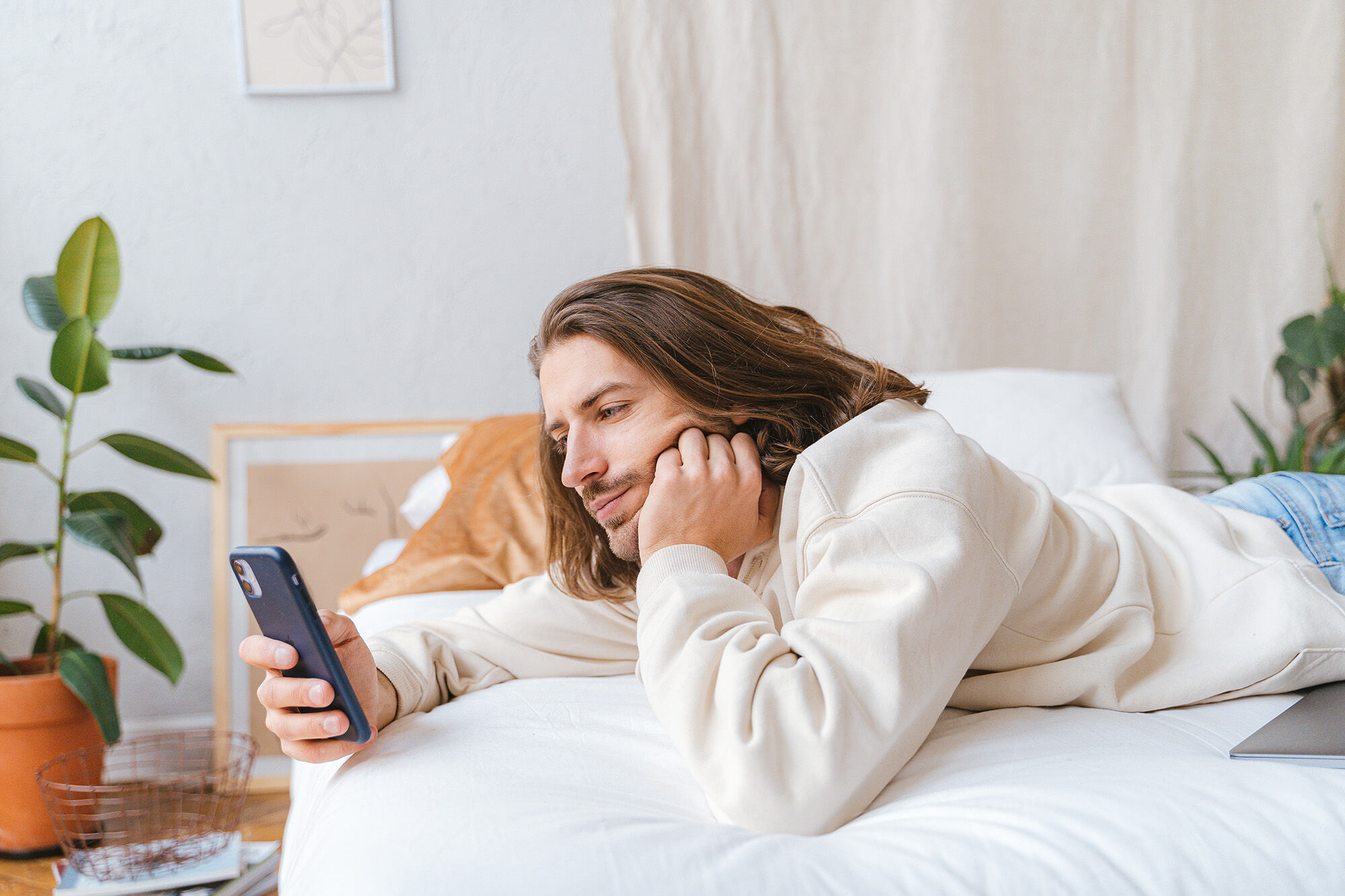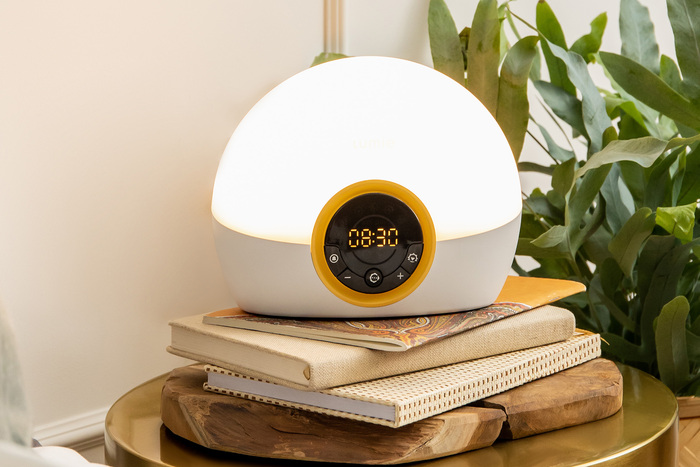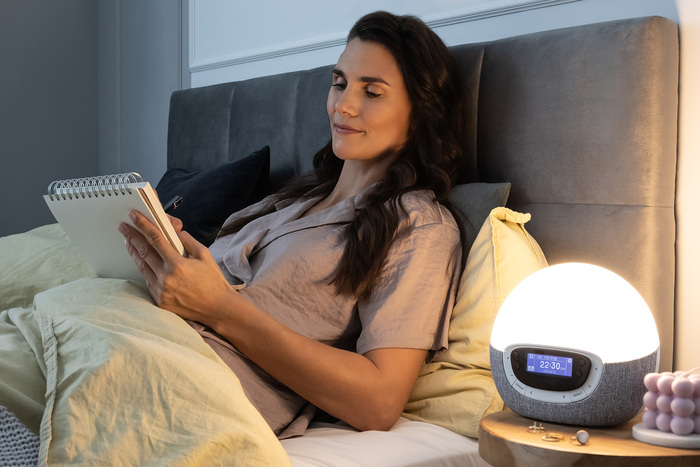How to Ban Your Phone from Your Bedroom in 3 Easy Steps

Unless you already use a Lumie wake-up light or an old-school alarm clock, chances are you rely on your smartphone as an alarm. At bedtime, you end up scrolling through countless Instagram reels, TikTok videos, tapping on the latest breaking news notification as you catch up on emails and text messages. Finally, you put it away, and sooner or later, the sleep comes. Sometimes it’s disrupted, and as you lay awake, you pick up your phone to check the time wondering how much more sleep you might get if you go back to sleep now. You check a few apps, put it down again, fall asleep eventually. Startlingly, what feels like only a few moments later, the alarm jolts you awake; and now, with the phone in your hand, the cycle restarts; reels, videos, messages, news… you get the idea.
Short answer; yes. Long answer; absolutely. Research has shown that using your phone for at least half an hour before bed contributes to poor sleep quality, due to its alerting blue light and stimulating content. Sleep expert Matthew Walker puts an emphasis on limiting our use of screens in the hours before sleep. “Stay away from screens, especially those LED screens — they emit blue light that actually puts the breaks on a hormone called melatonin. And melatonin helps the healthy timing of our sleep.” Walker says that for this very reason, all blue-light emitting devices trick our brains into thinking that it's still daytime. Instead, he recommends we unwind in more dimly lit environments closer to bedtime. “We are a dark-deprived society in this modern era, and we need darkness in the evening to allow the release of melatonin.”
Even though the science checks out, learning to keep your devices away from your bedroom may seem like quite a challenging prospect. A 2018 study has shown that 39% of people aged 18 – 30 have been experiencing symptoms of smartphone addiction. We can imagine that this percentage only grew since the outbreak of the global pandemic in early 2020! Sounds scary? We like to think it sounds empowering, because transforming your bedtime habits is easier than you think, and much more of a game-changer than you realize. Here are the three reasons why...
Knowledge is power. Average time spent consuming content is estimated to be at around 7 hours a day – that is more than some adults sleeping! Let that sink in for a moment. You spend more than enough time ‘on’ during the day to let the always-on culture paired with FOMO (fear of missing out) rob you of a good night’s sleep and all the benefits that come with it.
The first step to take back control is therefore to learn to draw the line on using your phone in the hour(s) before sleep. You can even follow Arianna Huffington’s footsteps and make it into a ritual! She uses a charging station (which looks like a bed) for all of her devices before bedtime. “You put your phone under the blanket and you tuck it in and say goodnight,” Huffington says. Freeing yourself from the proximity of your device gives your brain the room to ‘breathe’ and do something else, like reading, meditating, or simply catching up with your person. Speaking of pillow talk, if you share a bedroom with a partner, leaving phones in another room applies to you both!
What is the first thing that you would like to do with the newly gained “you-time” now that your devices are tucked in and forgotten about? If the first thought that comes to you is the urge to scroll Instagram or check your notifications, take a deep breath. Rest assured, not one text message or email that arrives in the hour or two before sleep can't wait until the next morning. If you're truly worried about missing an important family update or an emergency, charge your phone near your bedroom door with the "Do Not Disturb" mode on. Make sure all notifications and alerts from emails, texts and incoming calls are switched off, except from a few important contacts that you program. Otherwise, allow yourself to unplug and focus on yourself and your environment (check out our top tips on how to optimise your bedroom for best-ever sleep). Once you're settled in your screen-free sleep sanctuary, turn on your personalised sunset, designed to help you unwind and fall asleep easily and naturally. You'll nod off before you know it, and feel so much more productive when you wake up!
Better yet, get an alarm clock that wakes you up gradually with dawn simulation. Our Bodyclock sleep/wake-up lights mimic the light and colour of a real sunrise. The ever-increasing light levels travel through the closed eyelids via the optic nerves to an area of the brain (called the suprachiasmatic nucleus to be exact) that controls the body’s circadian rhythm. It is the master clock of the body responsible for regulating the patterns of sleep and wakefulness, metabolism, hormone release (melatonin and cortisol for instance), body temperature, and more.
Because the sunrise simulation is gradual, it allows your master clock to prepare for waking naturally and gradually. Once the light signal is picked up by the brain, your body temperature and heart rate start rising slowly, while the melatonin production is suppressed, making way for cortisol levels to increase. This way, by the time you open your eyes, your room is bright, and you feel calm and at the ready to seize the day. A traditional alarm (or your phone!) jolts you awake with a burst of loud sound without preparing your whole body for waking, leaving you feeling disoriented and groggy, with your heart rate elevated and mood ruined.
The more you stick to your new screen-free bedtime routine, the more natural it will feel to not have your phone close to you at all hours of the day, demanding your attention and tempting you to scroll some more. And who knows, perhaps in time you'll realize that the first moment you pick up your mobile phone is to take it with you as you leave for work in the morning.

